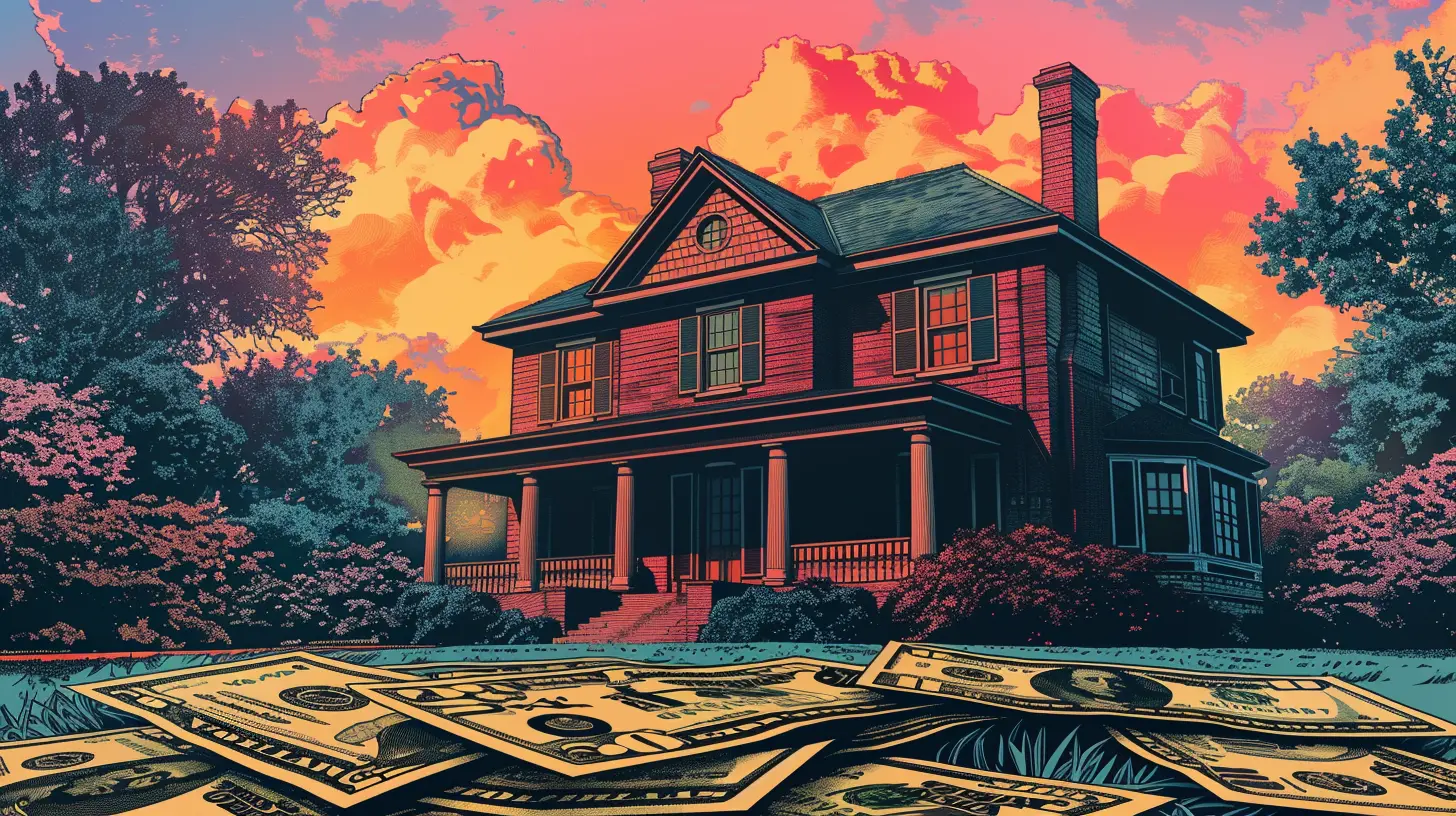Closing Costs Explained: Legal, Appraisal, and Inspection Fees
16 December 2024
Buying a home is an exciting adventure, isn’t it? There’s the thrill of house hunting, imagining your future life inside those four walls, and even daydreaming about furniture arrangements. But then, reality sneaks in with "closing costs." Yep, those pesky extra expenses that seem to pop out of nowhere as you’re about to sign on the dotted line. Don’t worry—I’m here to calm the storm and break it all down for you.
In this article, I’ll walk you through the nitty-gritty of closing costs, focusing specifically on the legal, appraisal, and inspection fees. You’ll leave this piece feeling like a total pro who can navigate closing costs with ease. So, let’s dive in, shall we? 
What Are Closing Costs?
Before we jump into the details, let’s cover the basics—what exactly are closing costs? Simply put, closing costs are the fees and expenses you pay when finalizing a real estate transaction. Think of it as the financial "fine print" tied to buying your dream home.These costs cover a variety of services, from legal paperwork to ensuring the property is in good shape. The catch? They can add up quickly and usually range from 2% to 5% of the home’s purchase price. For a $300,000 home, we're talking anywhere between $6,000 and $15,000. Not exactly pocket change, right?
While closing costs encompass many elements, today, we’re zooming in on three major players: legal fees, appraisal fees, and inspection fees. Each of these plays a unique role in getting you across the finish line. 
Legal Fees: The Gatekeepers of Your Real Estate Deal
What Are Legal Fees?
Think of legal fees as your safety net. These charges cover the services of a real estate attorney or a title company that ensures everything is above board. From reviewing contracts to handling the title transfer, their job is to protect your interests and prevent you from getting blindsided by any legal hiccups.Why Do You Need Them?
Let’s face it—buying a home isn’t like grabbing a coffee at your local café. It’s a mountain of paperwork, full of legal jargon that can make your head spin. Real estate attorneys are like translators who make sure you’re not signing something that will come back to bite you later.Here’s a quick example: Imagine buying a house only to find out someone else has a claim on the property. A title search (handled by your attorney or title company) ensures the home is legally yours. Legal fees might feel like a pain now, but trust me—they’re worth every penny.
How Much Should You Expect to Pay?
The cost of legal fees varies depending on your location and the complexity of your transaction. On average, you can expect to pay anywhere from $500 to $1,500. It’s not the cheapest expense, but consider it an investment in peace of mind.
Appraisal Fees: Determining Your Home's True Value
What Are Appraisal Fees?
Ever heard the saying, “Don’t judge a book by its cover”? That applies to homes, too. An appraisal is an unbiased assessment of a property’s value, conducted by a licensed appraiser. The fee you pay for this service is called an appraisal fee.Why Do You Need an Appraisal?
Let’s be real—the number on the price tag doesn’t always match the actual value of the property. As a buyer, you don’t want to pay more than a home is worth. On the flip side, lenders want to ensure their investment is sound before they hand over the big bucks.The appraiser considers factors like the home’s size, condition, location, and recent sales of similar properties in the area (aka “comps”). Think of them as a detective piecing together clues to figure out what the house is truly worth.
How Much Should You Expect to Pay?
Appraisal fees typically range from $300 to $700, depending on your location and property size. This is a one-time cost that gets added to your closing expenses. Sure, it’s not free, but it’s a small price to pay for knowing whether the asking price is fair.
Inspection Fees: Uncovering Hidden Issues
What Are Inspection Fees?
If an appraisal is like judging the book's worth, an inspection is like reading between the lines. Inspection fees cover the cost of hiring a professional inspector to examine the property for any underlying problems.Think of it as a home’s health check-up. From the foundation to the roof, and plumbing to electrical systems, inspectors leave no stone unturned.
Why Do You Need a Home Inspection?
Would you buy a car without popping the hood? Of course not! The same logic applies here. A home inspection can reveal issues like a leaky roof, faulty wiring, or mold lurking where you’d least expect it.Sure, the house may look picture-perfect on the outside, but an inspection ensures there aren’t any ugly surprises waiting for you after move-in day. Plus, if the inspection uncovers major issues, you can negotiate with the seller to either fix them or lower the price.
How Much Should You Expect to Pay?
Inspection fees usually range from $300 to $500. The cost depends on the size of the home, as larger properties typically require more time and effort to inspect. Pro tip: Don’t skimp on this! It could save you thousands in repair costs down the road.How to Plan for Closing Costs
Now that you’ve got the scoop on legal, appraisal, and inspection fees, you might be wondering—how do you plan for all of this? Well, the good news is that these costs aren’t meant to be a surprise. Lenders are required to provide you with a Loan Estimate within three days of your application. This document gives you a breakdown of all the anticipated closing costs, so you can budget accordingly.Also, don’t hesitate to shop around for services. You’re not locked into using the first attorney, appraiser, or inspector you come across. Compare fees and reviews to ensure you’re getting great service at a fair price.
Can Closing Costs Be Negotiated?
Ah, the golden question—can you negotiate closing costs? The answer is a resounding maybe! While some fees (like government recording charges) are set in stone, others (like attorney fees) may have some wiggle room.You can also ask the seller to cover part of the closing costs, known as “seller concessions.” This is more common in a buyer’s market when sellers are eager to close the deal. It’s always worth asking—after all, a penny saved is a penny earned!
Wrapping It Up
Closing costs might not be the most glamorous part of buying a home, but they’re an essential piece of the puzzle. By understanding legal fees, appraisal fees, and inspection fees, you’re better prepared to tackle this process head-on.Remember: Knowledge is power (and savings). Don’t let the fear of closing costs overshadow the excitement of buying your dream home. With a little preparation and a dash of negotiation, you’ll be handing over those keys and popping the champagne in no time.
all images in this post were generated using AI tools
Category:
Closing CostsAuthor:

Camila King
Discussion
rate this article
14 comments
Reid McAleer
Great overview! This clarifies essential closing costs.
April 4, 2025 at 10:57 AM

Camila King
Thank you! I'm glad you found the overview helpful.
Arwenia McLean
Understanding closing costs empowers you on your home-buying journey. Knowledge is key to making informed decisions and achieving your dream of homeownership!
January 29, 2025 at 12:41 PM

Camila King
Absolutely! Understanding closing costs is crucial for making informed decisions and ensuring a smooth home-buying experience. Thank you for emphasizing the importance of knowledge in this journey!
Rusty McFarlane
Understanding closing costs is crucial for buyers; legal, appraisal, and inspection fees can significantly impact your overall budgeting and financing strategies.
January 22, 2025 at 5:49 AM

Camila King
Absolutely! Understanding these costs is essential for effective budgeting and financing throughout the buying process.
Zander Bass
This article does a commendable job of breaking down closing costs, yet it could delve deeper into the implications of these fees on overall affordability. Highlighting potential negotiation strategies or variations across regions would empower buyers to navigate this complex landscape more effectively, ensuring they are fully informed before closing.
January 14, 2025 at 1:33 PM

Camila King
Thank you for your insightful feedback! We'll consider incorporating deeper discussions on affordability implications, negotiation strategies, and regional variations in future updates.
Zarek Cain
Unlock the door to your dream home with confidence! Understanding closing costs is essential for every homebuyer. By knowing the ins and outs of legal, appraisal, and inspection fees, you’re not just purchasing property—you’re investing in your future. Knowledge is your greatest asset!
January 8, 2025 at 4:52 AM

Camila King
Thank you for your insightful comment! Understanding closing costs truly empowers homebuyers to navigate the purchasing process with confidence. Your points about investment and knowledge are spot on!
Shannon McMahon
Great insights on closing costs! 🏡 While they might seem daunting, understanding legal, appraisal, and inspection fees can make the home-buying process smoother. Remember, every dollar invested brings you closer to owning your dream home. Keep up the great work, and happy house hunting! ✨💖
January 5, 2025 at 11:36 AM

Camila King
Thank you for your kind words! Understanding closing costs is essential for a smooth home-buying experience. Happy house hunting! 🏡✨
Riven Estes
Great breakdown of closing costs! Understanding these fees is crucial for buyers and sellers alike. Thank you for the insightful article!
January 3, 2025 at 1:24 PM

Camila King
Thank you for your kind words! I'm glad you found the article helpful in understanding closing costs.
Candace Velez
This article sheds light on often-overlooked closing costs, emphasizing their importance in the home-buying process. Understanding these fees can empower buyers to make informed financial decisions. Great insights!
December 30, 2024 at 9:20 PM

Camila King
Thank you for your feedback! I'm glad you found the insights on closing costs helpful for making informed decisions.
Zadie McGeehan
Know your costs; they impact your investment!
December 28, 2024 at 5:02 AM

Camila King
Absolutely! Understanding your closing costs is crucial, as they directly affect your overall investment and financial planning.
Ulrich Luna
Understanding closing costs is the key to a successful real estate journey! Equip yourself with knowledge on legal, appraisal, and inspection fees, and make informed decisions that pave the way to your dream home!
December 25, 2024 at 9:31 PM

Camila King
Absolutely! Knowledge of closing costs is essential for navigating the real estate process effectively. Understanding these fees empowers buyers to make informed decisions and ensures a smoother journey to homeownership.
Chase Vasquez
This article provides a concise overview of closing costs, breaking down essential fees like legal, appraisal, and inspection expenses. It’s a valuable resource for buyers and sellers, ensuring transparency and helping them budget effectively for a smooth transaction process.
December 22, 2024 at 12:32 PM

Camila King
Thank you for your feedback! I'm glad you found the article helpful and informative.
Grey Roberson
Closing costs can significantly impact affordability; understanding them ensures a smoother home-buying experience.
December 18, 2024 at 2:02 PM

Camila King
Absolutely! Being informed about closing costs helps buyers budget effectively and reduces surprises at the final stages of the home-buying process.
Soraya Fisher
Great overview! Clear breakdown of costs helps first-time buyers plan better.
December 17, 2024 at 1:02 PM

Camila King
Thank you! I'm glad you found it helpful for planning your home purchase.
Finn Yates
Essential insights for transparent home buying!
December 17, 2024 at 3:23 AM

Camila King
Thank you! I'm glad you found the insights helpful for a transparent home buying experience.
MORE POSTS

Real Estate Podcasts Offering Insider Tips on Financing and Mortgages

Why Real Estate Agents Are Crucial in Navigating Legal Aspects of Property Sales

Maximizing Space in Small Homes Through Smart Renovations

The Benefits of a Biweekly Mortgage Payment Plan

Vacation Home or Second Home? Understanding the Difference

The Legal Impact of Bankruptcy on Real Estate Ownership

Key Landlord-Tenant Laws You Need to Be Aware Of

What You Need to Know About Real Estate Non-Disclosure Clauses

The Importance of Walkability in Urban Neighborhoods